AI & Agentic AI in Education: Transforming the Future of Learning

AI & Agentic AI in Education: Shaping the Future of Learning
Artificial Intelligence (AI) is transforming education worldwide, making learning more personalized, accessible, and efficient. Beyond conventional AI, Agentic AI is pushing boundaries further by creating autonomous AI agents capable of making decisions, adapting in real-time, and actively assisting both students and educators. Together, these technologies are redefining how knowledge is delivered, how students engage with learning, and how teachers manage classrooms.
In this article, we’ll explore AI and Agentic AI in education, their real-world applications, benefits, challenges, and the future potential of AI-driven learning.
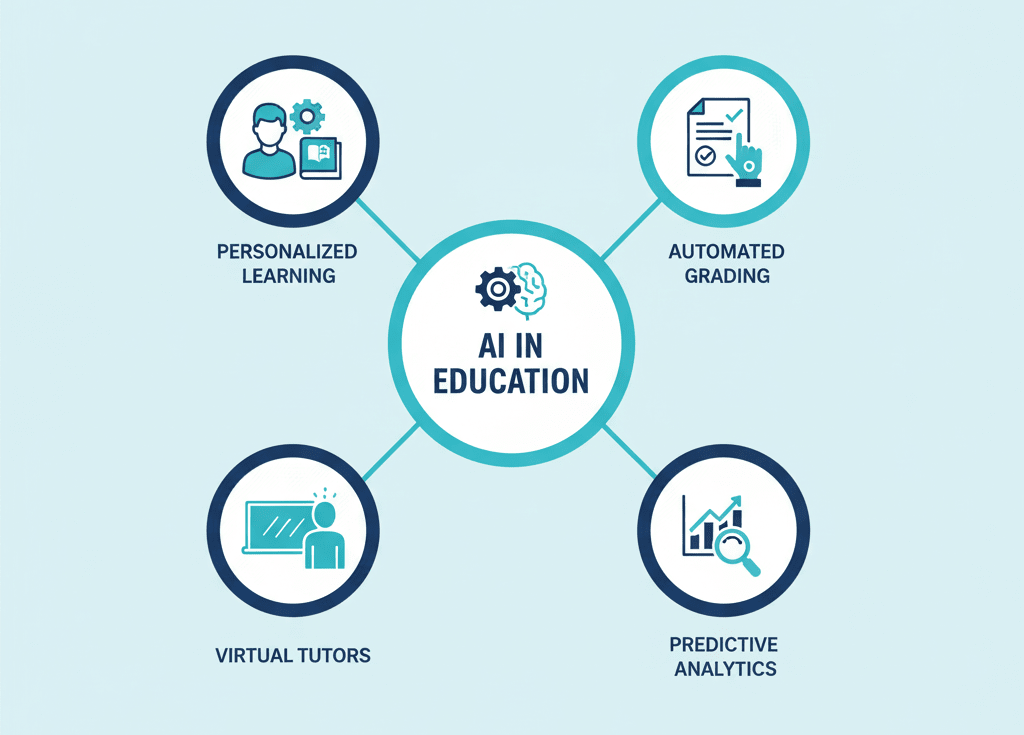
Understanding AI in Education
AI in education refers to the integration of intelligent systems and algorithms to enhance teaching, learning, and administrative processes. By analyzing student data, AI can personalize content, automate repetitive tasks, and provide adaptive feedback to optimize learning outcomes.
Examples of AI in education include:
For Students: Grammar-checking software, flashcard apps, and text-to-speech platforms.
For Educators: Plagiarism detection tools, lecture transcription software, and automated grading systems.
AI technologies commonly used in education include machine learning (ML), natural language processing (NLP), and predictive analytics. Their applications include:
Personalized Learning Platforms – AI adapts content and learning paths based on each student’s progress and abilities.
Automated Grading & Assessment – Reduces teachers’ workloads by evaluating assignments, quizzes, and exams automatically.
Chatbots & Virtual Tutors – AI-powered assistants offer 24/7 support, answering questions and guiding students outside classroom hours.
Predictive Analytics – AI analyzes student performance to identify potential learning gaps and provide timely interventions.
By leveraging these tools, schools and universities can create a more inclusive, engaging, and effective learning environment.
What is Agentic AI?
While traditional AI assists with specific tasks, Agentic AI takes autonomy to the next level. These systems can make decisions, reason through complex problems, and take proactive actions without continuous human supervision. Agentic AI can self-improve, adapt dynamically, and optimize outcomes based on real-time data.
Key characteristics of Agentic AI include:
Autonomy: Ability to initiate and complete tasks independently, requiring minimal supervision.
Reasoning: Advanced decision-making considering context, trade-offs, and priorities.
Reinforced Learning: Continuous learning and adaptation from interactions and feedback.
Language Understanding: Ability to comprehend and follow complex instructions.
Workflow Optimization: Efficient execution of multi-step educational processes.
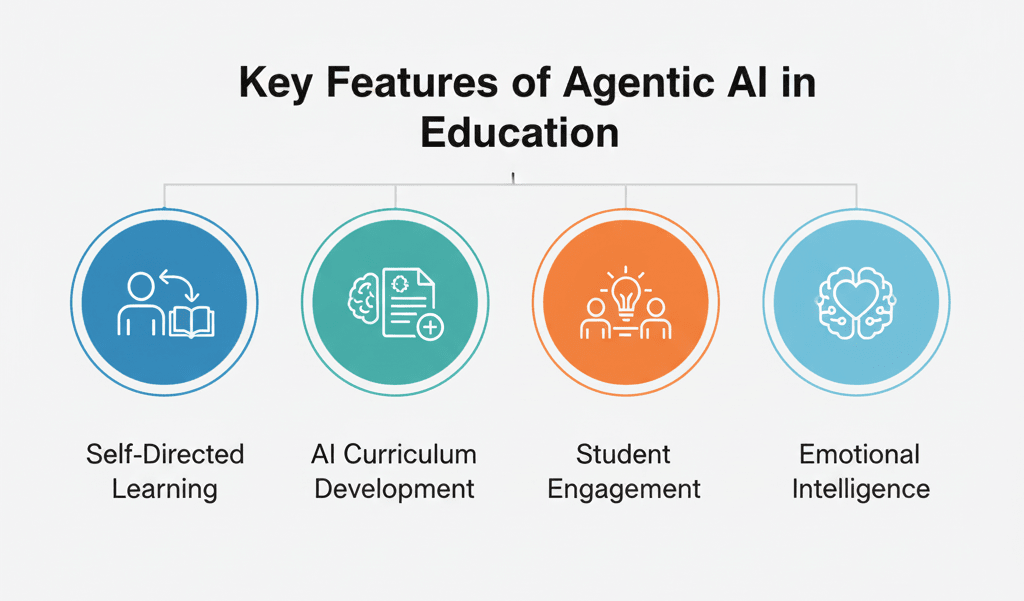
Key Features of Agentic AI in Education
Self-Directed Learning Agents: AI tutors assess each student’s knowledge and autonomously curate personalized learning paths.
AI-Driven Curriculum Development: Agentic AI designs syllabi and learning content, integrating the latest research and trends.
Autonomous Student Engagement: AI can detect struggling students and proactively intervene to re-engage them.
Ethical & Emotional Intelligence: Advanced systems can recognize emotions, adapting teaching methods to better suit each learner.
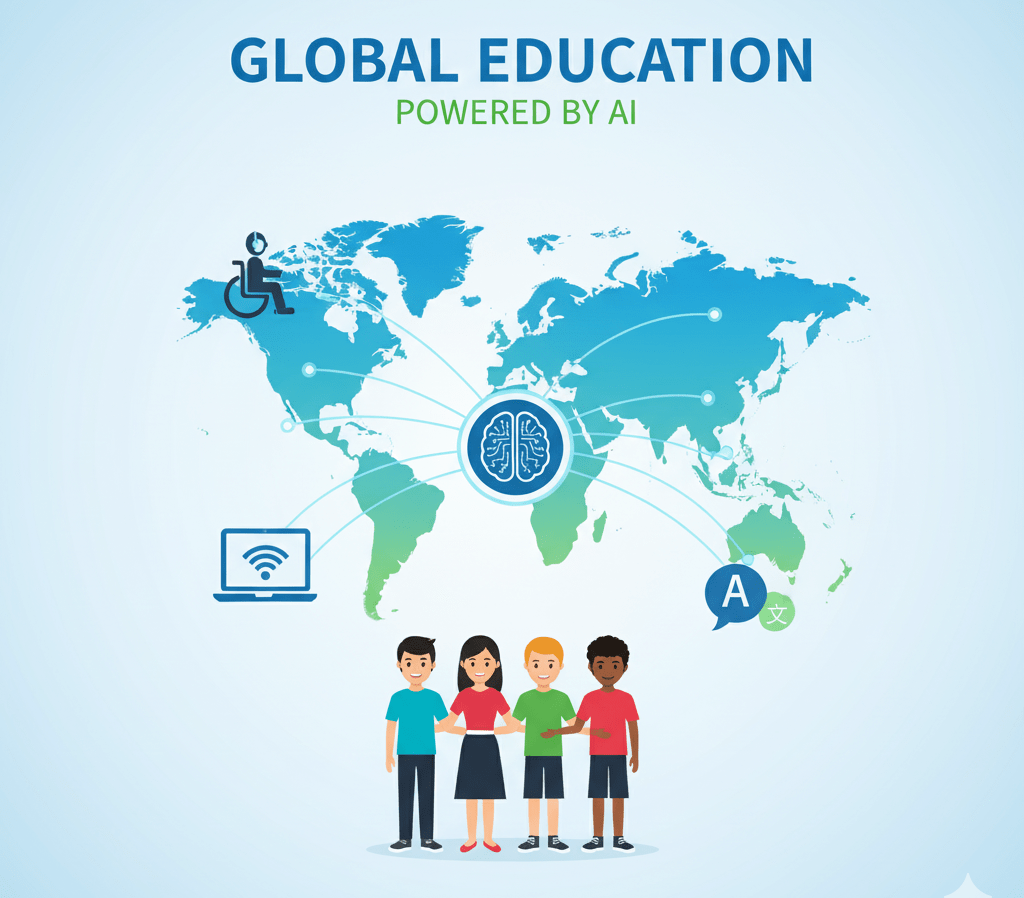
Global Impact of AI and Agentic AI in Education
1. Enhancing Accessibility & Inclusion
Language Translation & Speech Recognition: Tools like Google Translate and Microsoft’s Immersive Reader help students learn in their native languages.
Assistive Technologies for Disabilities: AI-powered tools, such as speech-to-text software or Braille readers, make education accessible to students with disabilities.
Remote Learning & Digital Classrooms: AI enables virtual classrooms, reaching students in underserved or remote regions.
2. Improving Personalized Learning
Adaptive Learning Platforms: AI analyzes individual student progress and customizes lessons to address gaps (e.g., Carnegie Learning’s MATHia).
Student Engagement Analysis: AI monitors attention and participation, adjusting content to maximize engagement.
3. Boosting Teacher Efficiency
AI Grading Tools: Platforms like Gradescope automate grading, freeing teachers for instruction and mentoring.
Curriculum Optimization: AI analytics identify at-risk students, enabling targeted support and interventions.
4. Addressing Workforce Readiness & Skills Gaps
AI-Powered Career Counseling: Tools recommend career paths based on students’ strengths, preferences, and skills.
Upskilling & Reskilling Programs: Agentic AI identifies learning needs and recommends tailored skill development resources.
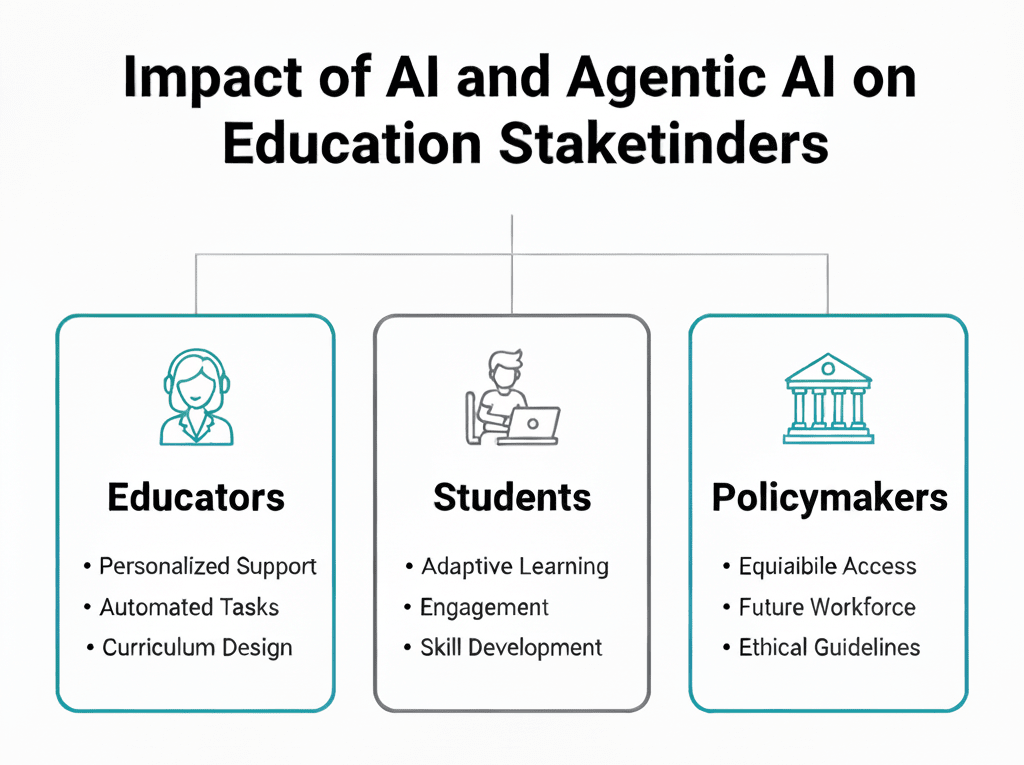
Impact on Stakeholders
Educators: AI reduces administrative burden, allowing more focus on creative teaching. Agentic AI can function as a co-teacher, providing real-time support.
Students: AI personalizes learning experiences, while Agentic AI dynamically adjusts lessons to maintain engagement and optimize outcomes.
Policymakers: Data from AI analytics helps guide policy decisions, curriculum updates, and equitable access initiatives.
Parents: Platforms like Duolingo provide insights into children’s learning progress and suggest additional resources.
EdTech Companies: Agentic AI enables fully autonomous learning platforms, potentially reducing the need for instructor-led courses.
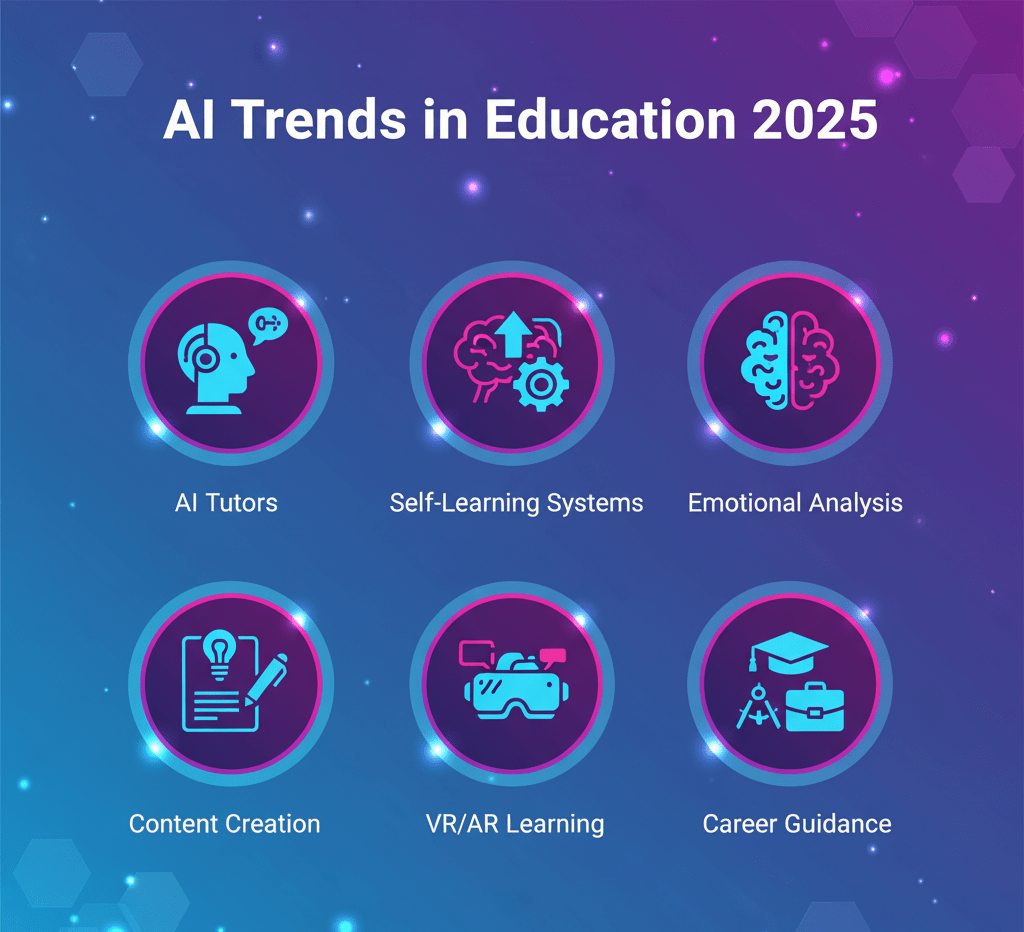
Current Trends in AI & Agentic AI in Education
AI-Powered Virtual Tutors & Chatbots: Tools like Google’s Socratic and IBM Watson Tutor answer student queries, provide guidance, and support self-paced learning.
Self-Learning Agentic AI Systems: Autonomous AI models design lesson plans, adjust learning paths, and predict student performance without constant human oversight.
Emotional & Behavioral Analysis: AI sentiment analysis tools monitor engagement, cognitive load, and emotional state to help educators adapt their teaching.
AI-Driven Content Creation & Assessment: Platforms like Cognii and Gradescope generate assignments, essays, and instant feedback.
VR/AR Integration: Microsoft HoloLens and ClassVR combine AI with immersive experiences to enhance STEM and medical education.
Career & Skill Development: AI recommends personalized career pathways and skill-building opportunities.
Responsible AI & Bias Mitigation: Ethical AI ensures fairness in grading, content recommendations, and accessibility.
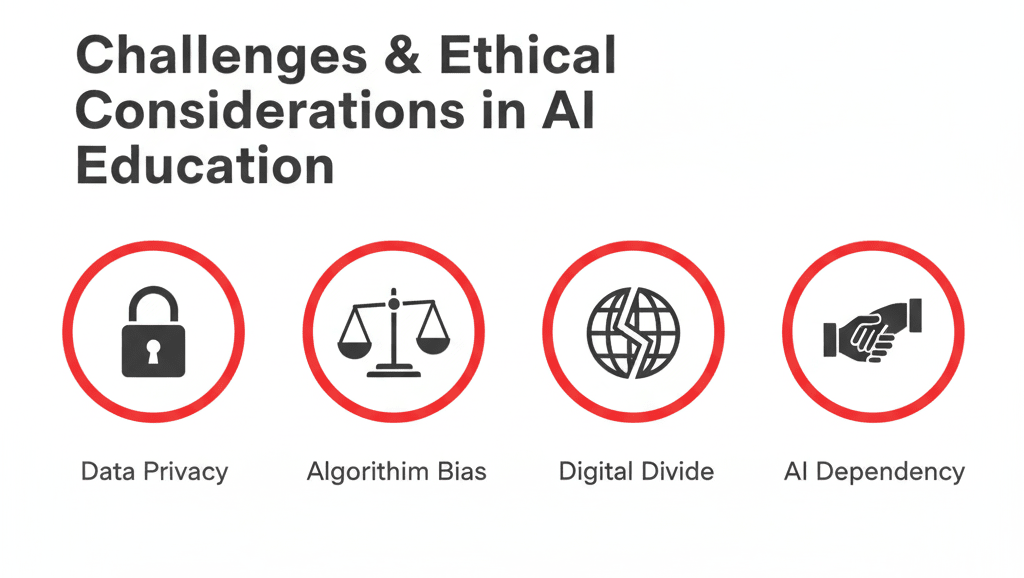
Challenges & Ethical Considerations
Data Privacy & Security: Large volumes of student data raise compliance concerns (GDPR, COPPA). Strong frameworks are required to safeguard information.
Bias in AI Algorithms: AI trained on biased data may reinforce inequalities. Continuous monitoring is essential for fairness.
The Digital Divide: Unequal access to AI infrastructure can widen educational gaps between privileged and marginalized communities.
Over-Reliance on AI: Excessive dependence on AI tutors may reduce human interaction, affecting social learning and critical thinking.
The Future of AI & Agentic AI in Education
The future promises hyper-personalized learning, self-evolving AI tutors, and intelligent automation, making education more adaptive and engaging. Key trends include:
Enhanced Understanding and Implementation: Institutions will increasingly leverage AI to streamline administrative tasks, track engagement, and assess performance.
Customized Learning Experiences: AI will continue to provide tailored lessons, bridging learning gaps and improving outcomes.
Regulations and Security: New policies will ensure ethical and secure AI deployment, focusing on transparency, fairness, and data privacy.
AI Fundamentals for Educators: Professional development programs will teach teachers to effectively integrate AI, combining technical knowledge with practical classroom strategies.
The success of AI in education depends on:
Human-AI Collaboration: Teachers use AI as a support system rather than a replacement.
Ethical AI Frameworks: Ensuring fairness, transparency, and inclusivity in learning.
Scalable Solutions: Making quality education accessible globally, across socio-economic boundaries.
AI is not replacing educators it is empowering them to create smarter, lifelong learners.
Conclusion
AI and Agentic AI are reshaping education by improving accessibility, personalization, and efficiency. These technologies provide educators with valuable insights, streamline administrative processes, and deliver tailored learning experiences for students. Moving forward, AI should be seen as a tool that complements human instruction, guided by ethical frameworks, clear regulations, and transparent implementation.
By embracing AI thoughtfully, we can build an educational ecosystem that is adaptive, inclusive, and intelligent, preparing students for a rapidly evolving world while supporting educators in delivering high-quality, meaningful instruction.
Join the conversation
Sign in to share your thoughts and engage with other readers.
No comments yet
Be the first to share your thoughts!